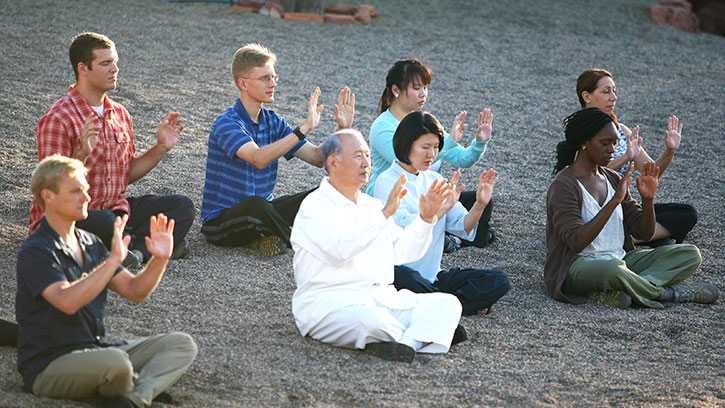
Our misconceptions about what it means to be spiritual may be hindering our spiritual growth.
When people think of someone “spiritual” or “enlightened,” they often envision someone who seems perfect. They picture a person who remains calm and compassionate, doesn’t suffer from worries or troubles, and always knows the right thing to do.
If they themselves don’t match this perception, they may look down on themselves and become discouraged. They may feel like they don’t measure up to their ideals. People with such ideas may also judge others, especially those who act as spiritual teachers or leaders. Seeing only a small part of what those teachers think and do from afar, they may view them as ungenuine.
To those people, I like to tell this story about Buddha:
Among Buddha’s disciples, there was one named Devadatta. He was a close cousin of Buddha and a very promising disciple. One day, Buddha went on a trip, leaving the ashram in Devadatta’s care. While Buddha was gone, Devadatta rose against him, caused a division among Buddha’s sangha, and left with half of Buddha’s disciples.
There was another disciple called Ananda. He was one of Buddha’s closest disciples and was truly faithful. Although Buddha appeared magnificent when communicating the laws and principles of Buddhism, Ananda saw Buddha suffer from the aftermath of Devadatta’s betrayal and felt that Buddha was no different from an ordinary man. This troubled him greatly. He saw his teacher get angry, experience regret, make mistakes, and suffer in pain. So, one day, he asked, “Buddha, are you truly Buddha? You are an enlightened being, and an enlightened person always has a devout disposition, is always at peace, and is always compassionate. But I see you in anguish and conflict. This is what troubles me. How can one who has achieved Buddhahood be in anguish?”
Upon hearing this, Buddha asked, “Ananda, do you believe in me?” Buddha posed this question to provoke Ananda to examine his own mind. Knowing that Ananda’s question came from a place of seeking truth and love for his teacher—not out of spite or misjudgment—Buddha explained, “Listen carefully. Anguish is no different from Buddhahood. My anguish does not come from my ego. It comes from a place of compassion, wondering how I can save my fellow humans.”
What Is the Root?
This distinction is important. Regardless of how much work we have done on ourselves, we will have thoughts and emotions; we will struggle. But what is the source of our thoughts and emotions? What is driving our actions? Do they stem from our true selves—our divinity? Or are they mired in our egos?
A preconception of how our true selves should look or feel is simply another construct of our egos. It is not actually our true selves. Judgment about how we measure up is also a characteristic of our egos.
Our true selves are perfect. Our efforts to express them in the real world, however, rarely are. We all make mistakes. I think what’s important is being honest with ourselves and continuing to try. I strive to reduce the number of errors I make and agonize over how I can achieve my goals well. Regardless of our trials or mistakes, if we stay on the path to fully embodying our true selves, that’s the greatest enlightenment and genuine spirituality.
Related Posts
- Three Treasures for Spiritual Completion
- The Nine Levels of Awareness on the Way to Enlightenment
- [Video] All We Need Is to Eat, Sleep, and Poop Well: Enlightenment Is Simple
- True Enlightenment Is . . .
- Enlightenment Is Not an Intellectual Exercise

1 Comment. Leave new
Very good one